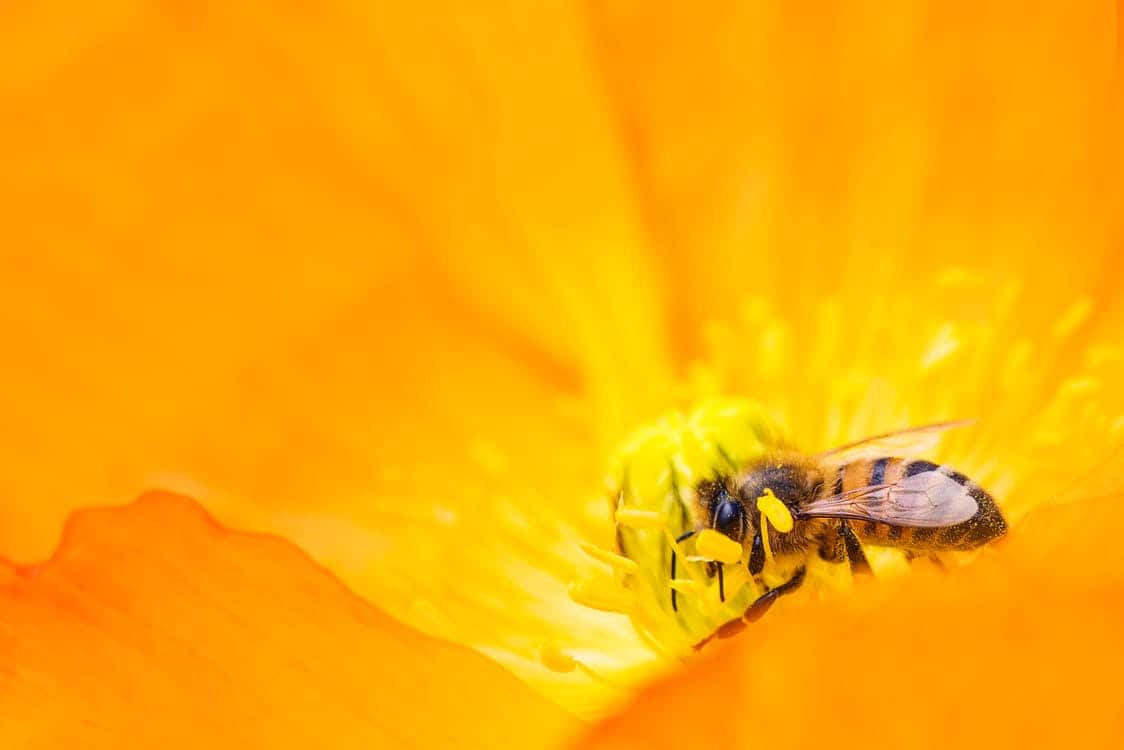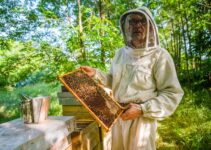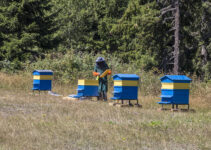A fun fact about honey is that the color, taste, and nutritional benefits of honey are partly determined by the flowers the honeybees get their nectar from. There are over 300 listed varieties of honey in the US alone, and one of the more popular ones is orange blossom honey.
Orange blossom honey is honey that is primarily made by bees that take the nectar from the white blossoms of an orange tree. Orange blossom honey can be raw or pasteurized, has a thick consistency, is usually light amber in color, and has a sweet citrus taste with mild hints of orange.
I love that there are so many different types of honey to choose from. You can experiment with different flavors in cooking dishes, baking, herbal teas, and so much more. Orange blossom is a popular choice because of its sweet citrus flavors and we’re going to tell you everything you need to know about this favorite Florida State Orange Blossom Honey.
What is Orange Blossom Honey?
Orange blossom honey is honey that is derived from the blossoms of an orange tree. Bees collect their nectar from the blossoms of the orange tree to create the honey in their beehives that result in the production of what we know as orange blossom honey.
Honeybees don’t necessarily know which blossoms they’re taking their nectar from, bees don’t have taste buds after all, but they can sense where the nectar and pollen are good, and the nectar in an orange blossom is abundant.
Orange blossom honey has a distinct taste that separates it from other kinds of honey and is commonly used in cooking and baking for sweetening, coloring, and providing an acidic orange taste in dishes.
What is an Orange Blossom?
The orange blossom is the sweet-scented flower produced on an orange tree with the following characteristics:
- Small, white petals
- Wax-like feel to the petals
- Strong citrus orange fragrance
- Each blossom contains five petals
- Each petal has an orange or yellow stamen
- Orange blossoms only grow one inch in diameter
- Orange blossoms grow in small clusters
Depending on the climate where the orange trees are growing will determine when the orange blossom buds start to grow. It could be as early as mid-winter in some climates, such as the subtropical Mediterranean areas of Europe.
All orange trees produce orange blossoms that grow into oranges, but not all of the blossoms develop into fruit. This means some orange trees can have both the blossoms and the oranges at the same time. They are beautiful looking fruit tree and it’s easy to see why bees are so attracted to them.
Orange trees grow so many orange blossoms that 99% of them fall off without ever having grown any fruit and many of the blossoms that do bear fruit will fall off in what’s called the “June drop” to leave room for bigger, stronger, oranges to grow.
Unlike other crops that might only grow one harvest in its preferred season in a year, orange trees are Evergreen. Meaning they can produce fruit all year long. They can, however, take up to 12 months or longer to ripen. Some orange trees will have two harvests growing at the same time on one tree.
On a quick side-note unrelated to orange blossom honey, if you want to grow a new orange tree from a seedling, keep in mind it can take up to six years for your orange tree to bear its first fruit.
If you’re asking how all of this is relevant to orange blossom honey, it’s because honeybees love orange blossoms!
Here Are Some Interesting Fun Facts About Orange Blossoms
- Native to subtropical southeast Asia
- Orange Blossom is the State Flower of Florida since Nov 1909
- Orange Blossoms were introduced in Florida by Spanish settlers in the 1500s
- Orange blossoms are used in perfume
- Orange trees are the most cultivated fruit tree in the world
- Orange blossoms symbolize purity, chastity, innocence, and fertility
Why Do Honeybees Love Orange Blossoms?
Worker honeybees love orange blossoms that bloom from orange trees because they are extremely rich in nectar. This, of course, is attractive to bees because they need nectar, and plenty of it, to make their honey to feed their larvae and survive cold winters.
How is Orange Blossom Honey Made?
Orange blossom honey is made in the same way that all honey is made… from busy bees working hard to collect nectar, pollinate more flowers while they’re collecting, and producing yummy honey in their hives.
Beekeepers that produce and process orange blossom honey place their beehives in and around orange groves that are typically filled with planted orange trees and sometimes among other citrus trees that provide fruits such as lemons, limes, tangerines, and grapefruits.
Bees are busy all the time, but their busiest period is the springtime where they collect nectar from over 100 plants a day from approximately a 2-mile radius. This is a much easier job for bee colonies that have been purposely placed in orange groves.
This is where they will collect the abundant nectar from the citrus trees in the orange grove and take it back to their beehives to get to work on producing an adequate amount of honey to get them and their bee colony through the winter.
Although orange blossom honey is mostly made from beehives in orange groves, there may be small traces of other citrus plants and flowers too from bees that have decided to collect their nectar elsewhere.
Beekeepers take what they need from the beehive to produce our much-loved orange blossom honey that, technically, the bees made for us first. Thanks, little bees.
If you’re interested in seeing these orange groves, you can check out this list of citrus groves in Florida that are open for touring and have gift shops with plenty of yummy honey goods, including some fresh and raw orange blossom honey.
Is Orange Blossom Honey Flavored?
Orange blossom honey almost tastes like oranges combined with honey. Sweet, acidic, and citrus-like flavors in one mouthful make for delicious, flavored honey.
While honey tastes like honey, orange blossom honey adds a natural and mild citrus flavor to the taste of the honey and has a subtle to strong hint of orange flavors depending on where the beehives are from.
Beehives placed in orange-only groves will produce a stronger orange flavor than those placed in groves with oranges among other citrus-flavored plants and trees which create a more subtle to mild orange flavor.
Honey will taste different depending on its original source of nectar and is typically very sweet to the taste buds. Honey is considered an alternate sugar as it is predominantly composed of fructose and glucose, which are two types of sugar.
Orange blossom honey is considered a sweeter tasting honey as far as honey goes, which is already pretty sweet seeing as honey is classified as a type of sugar as I mentioned above, because of the sucrose (sugar) found in the nectar of the plants that bees collect from.
The blossom of the orange tree is classified as a fragrant blossom, which produces an aromatic compound and flavor. In the case of the orange tree, an orange aroma and acidic, citrus taste similar to what you would taste when you bite into an orange.
- The whiter the color of the orange blossom honey, the more fragrant and orange tasting it will be because there are fewer other citrus plants used by the bees for collecting nectar
Where Does Orange Blossom Honey Come From?
Now that we know what orange blossom honey is and how the bees make the sweet citrus-flavored honey, let’s find out where orange blossom honey comes from in terms of geography.
Although this variety of honey was widely known to only be produced in the US, Italy, Spain, Mexico, Israel, and France, orange blossom honey is now also produced and cultivated in numerous parts of the world, including Australia and other parts of Europe, like Sweden.
Numerous countries import orange blossom honey so it can be purchased all over the world, including, but not limited to, the UK, Australia, and other parts of Europe.
The orange tree dates back thousands of years and was first mentioned in writing in Southeast Asia in 314 BC, so the orange tree could be much older than that. We’re not sure where, or when it was first produced and cultivated for the use of honey, but we’re glad it was.
Orange blossom honey is extremely popular in Florida US, and in Spain, where the orange blossom trees and bees are plentiful. Ample amounts of orange blossom honey are made in these parts of the world and exported far and wide.
Although orange trees aren’t native to Florida US, orange blossom honey is the most popular and common honey found in Florida and the orange blossom was named their state flower in the early 1900s.
What’s So Good About Orange Blossom Honey?
If you’ve ever tasted orange blossom honey, you probably wouldn’t be asking this question and would be satisfied knowing that the taste of this sweet honey is genuinely and undoubtedly superb – that is if you have a sweet tooth.
Aside from the oh-so-good taste of orange blossom honey, like other types of honey, this food product hosts numerous other advantages to benefit food and health lovers alike. Orange blossom honey, however, has stronger antimicrobial effects than other kinds of honey because it simply comes from an orange tree.
We all know oranges are good for us, right?
Here are the health benefits associated with the consumption and use of orange blossom honey:
Rich in minerals like potassium and glucose
Potassium helps your nerves to function correctly and assists your muscles to contract which keeps your heartbeat regular which in turn prevents high blood pressure. This will help to reduce stress and provide relief for symptoms of stress.
Glucose is one of the human bodies’ main sources of energy and helps to improve brain function and health. Glucose gives us the fuel we need to get up and get going.
Strengthens the immune system
Having a strong immune system will prevent unwanted germs and bacteria from manifesting in the body and producing harmful side effects that could result in the breakdown of various organs.
Reduces the effects of common colds
By strengthening the immune system, honey can reduce the effects of a common cold. The antimicrobial substances found in honey stop the growth of bad bacteria that would otherwise cause you to have flu-like symptoms (Runny nose, sore throat, headache, nasal congestion).
Honey is well-known for soothing sore throats too with a nice warm cup of tea. We say warm here because you don’t want to evaporate all the goodness out of the honey.
Have antiseptic properties known to ‘heal’ wounds and cuts
Some honeys, natural or raw not filtered or pasteurized, still contain antibacterial properties that can act as a protective barrier on cuts or scrapes, to prevent infection.
I’m not a doctor, so don’t take my word for it, but honey has been used for thousands of years to heal wounds.
Yup, if you can’t find the betadine, grab your natural honey out of the cupboard and once you’ve cleaned your cut you can place a little bit of honey over it!
Keep in mind, the honey you purchase from commercial shopping centers might not have the same nutrients and minerals as naturally produced raw and organic honey.
Contains antioxidants
We love antioxidants. Antioxidants protect our cells from damage, and this includes our skin cells. Substances that contain antioxidants are commonly used in skincare ingredients because antioxidants are known to benefit the healthy growth of skincare cells that reduce fine lines and wrinkles.
Antioxidants can protect our skin and other cells from damages like smoke inhalation, damage from the elements like wind and sun, and radiation, because they’re full of vitamins.
This also means that orange blossom honey can be used in face masks, and you can easily make them yourself at home. Remembering that raw honey is the best option if you’re making a face mask to benefit your skin. Pasteurized honey, which is typically most of the honey you find on the grocery store shelves, no longer has its nutritional benefits.
Can soothe tummy pains
Orange blossom honey has been known to reduce inflammation and soothe tummy pains and cramps. I wouldn’t eat it by the jar-load but instead would put it into a warm soothing tea that is also known for its tummy soothing qualities.
Herbal teas such as green tea, peppermint tea, and chamomile tea should do the trick.
Contains essential minerals
Our bodies need minerals like sodium, calcium, and zinc to name a few. Good for us, some orange blossom honeys are said to contain these essential minerals.
Sodium helps to keep the water and electrolyte levels of the body balanced for good hydration, calcium is essential for building strong bones and maintaining healthy functioning of your heart, muscles, and nerves, while zinc supports your immune system and your metabolism.
Promotes better sleep
As an essential oil, orange blossom helps to relax tense muscles and slow down heart palpitations, especially after a workout.
Some say that orange blossom honey has the same effects and in slowing the heart rate and calming tense muscles, can support good quality sleep.
Can I Cook with Orange Blossom Honey?
Orange blossom honey is delicious as a spread on pancakes and English muffins, in herbal and English teas, drizzled over a bowl of granola, and even in baking and cooking dishes.
Yes, you can cook with orange blossom honey, and we highly recommend it.
Here are a few ideas you can use to incorporate orange blossom honey into your cooking and baking dishes:
- Use as a sugar replacement
- Glazed over roast chicken or added to a slow-cooked roast chicken
- Use a marinade or sauce
- Add to your baked dishes like sweet bread and scones, but find a recipe that included honey first in case the consistency doesn’t work for that baked good
- Have you ever tried orange blossom honey and custard tarts? Here’s a recipe by delicious.com.au for apple and orange blossom honey tarts.
- And this orange blossom honey cake by electricrecipes.com is something I am very fond of as it’s easy to bake and tastes great. I can highly recommend you try it, I don’t think you’ll be disappointed.
Orange blossom honey can degrade over time, and it may change in color but honey is generally good to eat for a long time if stored correctly, in a cool, dry, and dark place.
Conclusion
Not only does orange blossom honey look good, with its golden to white appealing color, but it also has a beautiful citric fragrance, a deliciously mild orange taste, you can use it for cooking, and it has numerous health benefits.
Orange blossom honey is carefully curated by beekeepers who keep their bee apiary close to orange trees, groves, and orchards, for both bees and humans to reap the multiple benefits of orange blossom honey.
References
Orange Fruit Harvest – Can You Harvest From A Flowering Orange Tree (gardeningknowhow.com)
Orange blossom honey – MAES HONEY





We have a citrange orange tree that is about 30 years old. It has at least 3 parents. Grapefruit , (wild 3 leaved orange Citrus Trifoliata) and Sweet orange and maybe more other varieties. The
unusual bit is that it is in Nottingham UK. It is the sweetest scented blossom and flowers usually in June.
I’ve always commented to my Wife, all we need now is a beehive! We did just that early July 2021. It will be very interesting to see when and if we get honey from these incredible bees what the honey tastes like.
It has flowered without fail outside in a sheltered spot all these years and is very prolific even after the frosts of minus 14C when it froze severely in November about 7 years ago.
Mike Salfeld a Citrus expert thinks it is a Citrumello but Jorgan Koskinen says it may well be unique in it’s cold resistance because this could happen when a Citrus is grown from a pip
as this tree certainly was. It was given to me by a nursery in Lincolnshire 30 odd years ago and was in a pot, 18 inches or so tall! I love it.
Sounds like you have alot going on there Mick. Hope that honey tastes amazing when it finally comes 🙂
Good Afternoon!
I am a Chef that deals with a guest population that presents vast numbers of allergies.
We use Orange Blossom Honey in one of our sauces – The debate is whether or not Orange Blossom honey can be used for Orange allergies?
Can you shed any light
I would say you should ask this question to an allergy doctor as I don’t wish to hand out potentially fatal wrong info here!